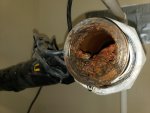A piece of a Schedule 80 plastic fitting broke on my RO machine. There was a bunch of glued fittings....so my only way to get up and running quickly.....was to replumb using brass fittings.
A LOT of plastic was removed and totally replaced with brass tees, barbs, reducers etc.
What effect will the RO water have on the brass fittings?
Any harm having brass instead of plastic?
A LOT of plastic was removed and totally replaced with brass tees, barbs, reducers etc.
What effect will the RO water have on the brass fittings?
Any harm having brass instead of plastic?





